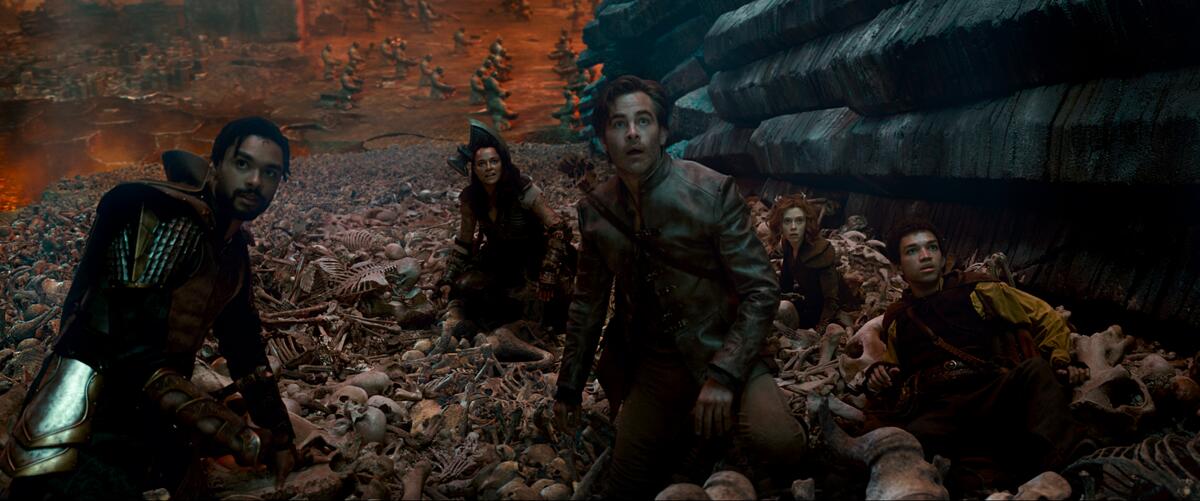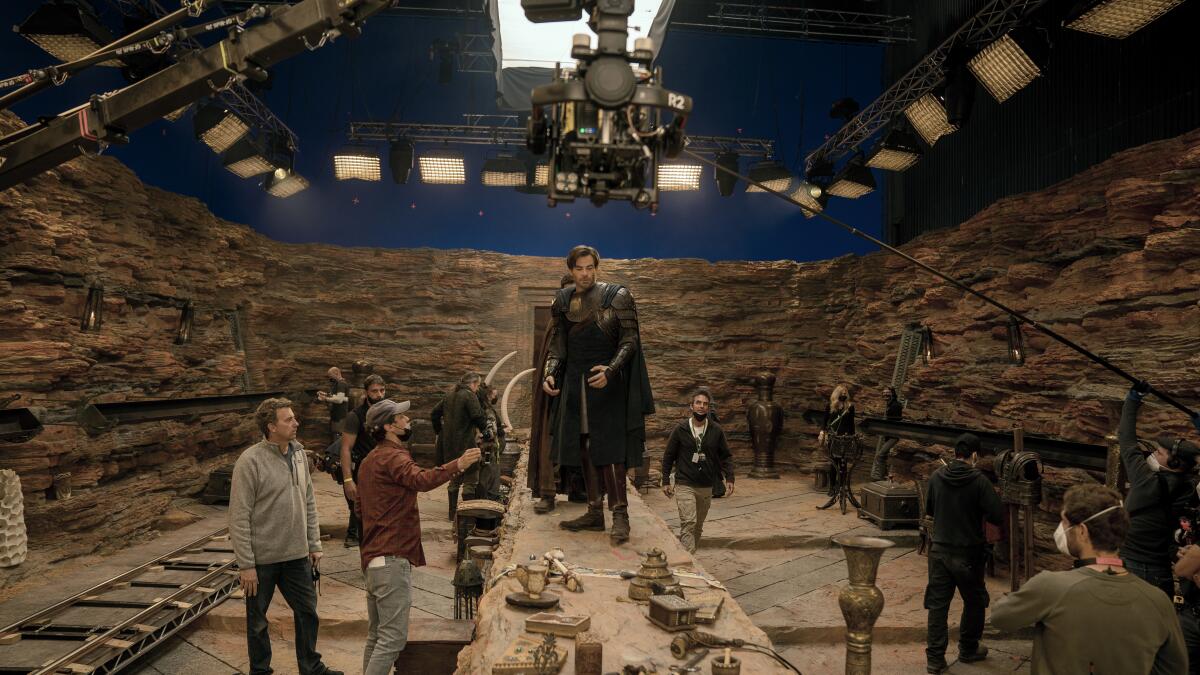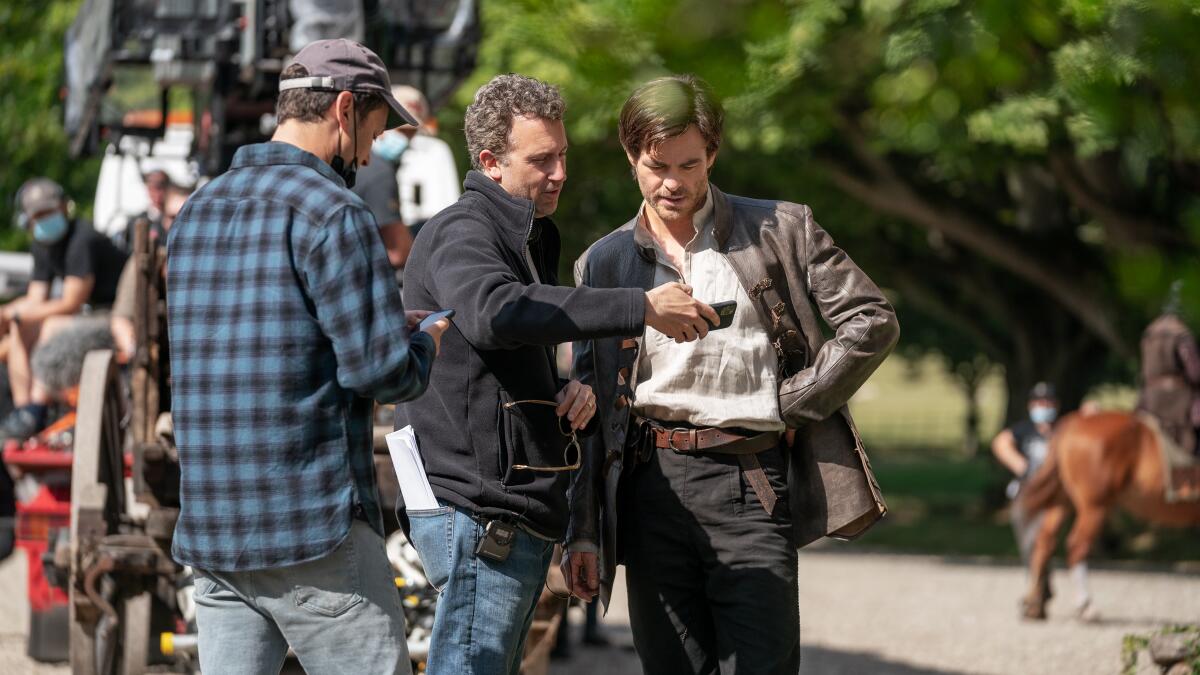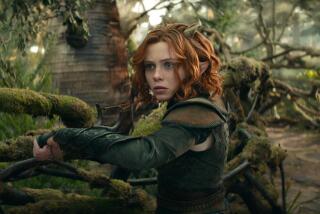Hollywood never did ‘Dungeons & Dragons’ justice. A new movie rolls the dice

- Share via
“Dungeons & Dragons: Honor Among Thieves” begins with actor Chris Pine begging for a second chance. His character, a lute-playing bard condemned to a tundra prison for “grand larceny and skullduggery,” stands before a clemency council, promising his jailers he’s reformed.
It might as well be a plea from the D&D franchise itself, which has a legacy of screen adaptations as checkered as the protagonist’s past.
The last high-profile stab at turning the popular tabletop role-playing game into a feature film, 2000’s New Line Cinema production “Dungeons & Dragons,” was savaged by critics and bombed at the box office. Two maligned nontheatrical sequels followed. Before that came a short-lived animated kids’ show in the ’80s.
“Honor Among Thieves,” which opens in theaters Friday after premiering at South by Southwest earlier this month, is looking to break the franchise’s curse.
Co-produced by Paramount Pictures and the Hasbro-owned studio eOne for $150 million, “Honor Among Thieves” is expected to take in more than $30 million from the U.S. and Canada in its opening weekend, according to analysts. That would be a decent start as long as it does well overseas and continues selling tickets in subsequent weeks, helped by its 89% Rotten Tomatoes score.
The film earned a strong $5.6 million from Thursday “preview” screenings, according to studio estimates.
“Nobody had done [D&D] justice yet,” writer-director Jonathan Goldstein said at the SXSW premiere. “Now justice has been done.”
Getting to this point was its own epic quest. The film’s origins stretch back a decade to a legal dispute between Hasbro and a production company over the adaptation rights. Adding to the baggage was Hollywood’s poor track record with adapting games of all kinds.
Video game adaptations such as “Super Mario Bros.” (1993), “Doom” (2005), “Prince of Persia: The Sands of Time” (2010) and “Warcraft” (2016) all suffered from some mix of critical dismissal, fan rebuke or box-office failure. Board game and toy adaptations have faced similar problems, as with “Battleship” (2012).
“Studios would acquire rights to these properties and not really take enough time to get to understand them or hire the right creative talents with some appreciation of those fan bases and those mythologies,” said Shawn Robbins, chief analyst at Boxoffice Pro. “And when you’re going up against big expectations like those of these franchises, that makes it even more of an uphill battle.”

But the winds have shifted in recent years.
A recent spate of game adaptations including “Detective Pikachu” (2019), “Sonic the Hedgehog” (2020), the “League of Legends” Netflix series “Arcane” (2021) and “Uncharted” (2022) have found commercial success, despite some still getting lukewarm reviews.
The forthcoming “Super Mario Bros. Movie” from Universal Pictures seems poised to keep up the streak. Warner Bros. releases “Barbie,” Greta Gerwig and Noah Baumbach’s take on the Mattel doll, this summer. In TV, HBO’s “The Last of Us” turned an award-winning video game into a prestige drama series.
That’s a positive trend for Hasbro, for which film and TV adaptations are a way to capitalize on the company’s most recognizable brands while also driving sales back to toys and games.
“Everything we’re doing, we’re trying to fuel play,” said Nathan Stewart, the head of franchise at Dungeons & Dragons publisher Wizards of the Coast, a subsidiary of Hasbro. “We make games and we fuel play.”
The toy company has long had ambitions of turning its biggest-name properties into larger entertainment franchises, in the vein of Paramount’s long-running “Transformers” series, based on the Hasbro toys. Hasbro has become increasingly hands-on with its game and toy adaptations in recent years.
In 2019, Hasbro acquired Entertainment One, or eOne, for about $4 billion to help make it a more serious media-business player. The toy company now is selling off parts of eOne, such as the Showtime series “Yellowjackets.” D&D and other Hasbro properties were excluded from the sale.
The new “Dungeons & Dragons” film is part of a larger plan for the brand. A Paramount+ television show is also in the works, which will be an independent story that explores a different part of the D&D world.
Hasbro’s efforts come as studios are scrambling to turn intellectual property — including books, plays, podcasts, Twitter threads, games and toys — into recognizable media properties.
“Brands and games and toys and other known IP are a treasure in brand awareness,” said Nick Meyer, president of film at eOne. “They’re a treasure, and everyone’s on the hunt.”
That game adaptations seem to have gotten better in recent years is in part because the upper echelons of the entertainment industry have been taken over by fans, executives said. Properties that were once considered the domain of “nerd culture” are now mainstream.
“These are our favorite things on the planet,” said Stewart, who was heavily involved in developing “Honor Among Thieves,” down to the spells and insignias seen onscreen. “Now we are in these roles of decision-makers and professionals with some good tenure under our belt, and so we can finally make the project that is so close to our heart.”
Yet as central as fans are to both the production process and the intended audience, they’re not the whole story.
The “Honor Among Thieves” filmmakers took pains to also make the project accessible to people who’ve never rolled a 20-sided die. The film includes nods to D&D’s decades of accumulated lore — a birdlike aarakocra in one scene, an offhand reference to “Baldur’s Gate” in another — without distracting from the plot.
It’s a marked difference from the 2000 flop, which many have criticized for getting too caught up in its own mythos.
“The biggest lesson probably from something like the 2000 movie is: Don’t make it just for the fans,” said Hasbro Chief Executive Chris Cocks. “Make sure that you tell a story that, even if you’ve never picked up a dice before or read one of the D&D books, you can relate to.”
It helps that the Dungeons & Dragons brand, which originated in the 1970s, is enjoying a pop-culture resurgence. It features prominently in Netflix’s ’80s nostalgia-fest “Stranger Things,” introducing younger audiences to a game their parents might have grown up playing. The game also has become popular among podcasters and livestreamers who use it as a vehicle for improvised storytelling.
The new movie appears to have further boosted interest in D&D. According to Fandom, a company that hosts wikis for online fan communities, the D&D-focused “Forgotten Realms” wiki has already seen 13% growth in pageviews this year. Pageviews across D&D-related wikis rose 9% after the first official “Honor Among Thieves” trailer dropped.
“Its franchise value extends across a broad range of demographics,” Perkins Miller, Fandom’s chief executive, said in an email.
It took a long time to make this latest attempt happen. Plans to make a D&D movie at Warner Bros., which had absorbed New Line, were entangled in a lawsuit over who had the rights to adapt the game. After the dispute was resolved in 2015, Warner Bros. moved ahead with its efforts — only to later pull back, paving the way for Hasbro to work on the film that would become “Honor Among Thieves.”

Starting around 2017, Hasbro worked with Paramount on an “‘Ocean’s 11’ meets ‘The Lord of the Rings’” heist film that, tonally, would reflect the original game’s not-too-serious ethos, Cocks said.
The project would in many ways be a repudiation of prior efforts to adapt D&D for the screen — but that doesn’t mean the brand has completely shed its history. The characters of the original ’80s kids show make a cameo in “Honor Among Thieves.” Could a more sustained revival of that property be on the horizon?
“That was one of my favorites when I was a little kid,” Cocks said. “I’d love to see us take another shot at something like that.”
More to Read
Inside the business of entertainment
The Wide Shot brings you news, analysis and insights on everything from streaming wars to production — and what it all means for the future.
You may occasionally receive promotional content from the Los Angeles Times.











